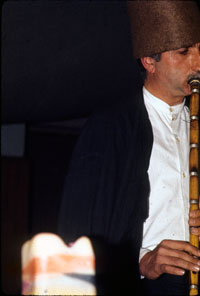|
Is there anything distinctively
"Mevlevi" about Mevlevi music?
Although similar in many ways to Classical
Turkish music (Klâsik Türk müziği, Türk sanat
mûsikîsi, Osmanlı Saray mûsikîsi), music of
the Mevle vi ritual differs in other ways. Some differences are easily
observable, even to the nonspecialist. Other differences are more subtle.
See also "extramusical"page. vi ritual differs in other ways. Some differences are easily
observable, even to the nonspecialist. Other differences are more subtle.
See also "extramusical"page.
The ney holds a position of honor
among the Mevlevi. It is only one instrument among many equals in the
Classical ensemble. The lengthy Mevlevi ney
improvisation is an important movement in its own right. Instrumental
improvisations in Classical concerts are
generally shorter and less important.
See Vicente
2007, especially Chapter 6, for non-classical genres of "musics for
the Mevlana."
|
Mevlevi vs. Classical: some
differences, similarities |
| |
|
Mevlevi |
|
Classical |
|
Poetry language |
|
Persian |
|
Ottoman Turkish |
|
Poetry author(s) |
|
Mevlana (Celaleddin al-Rumi) |
|
[varied] |
|
Extramusical |
|
Procession, whirling, silence,
etc. |
|
[minimal?] |
|
Instruments |
|
Ney, kudüm, cymbals (halile), optional classical instruments |
|
Tanbur, ney, kemençe, violin,
kanun, ud, etc. |
|
Improvisation |
|
Extensive introductory taksim, no modulating taksims |
|
Brief introductory & modulating
taksims |
|
Makam/seyir |
|
[No difference] |
|
Usul |
|
Embellished, limited variety |
|
Unembellished, wide variety |
|
Compound form |
|
Ayin/mukabele |
|
Fasıl |
|
Compound form usul sequence |
|
Idiosyncratic sequence |
|
Progresses from long/slow to
short/fast |
Home |
